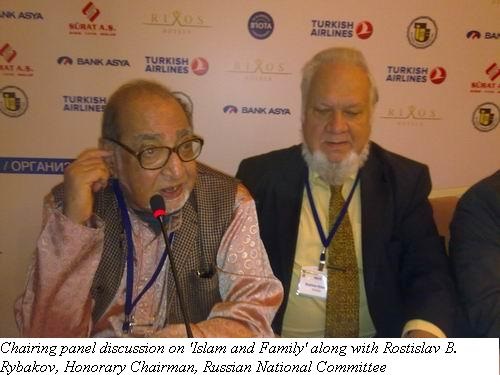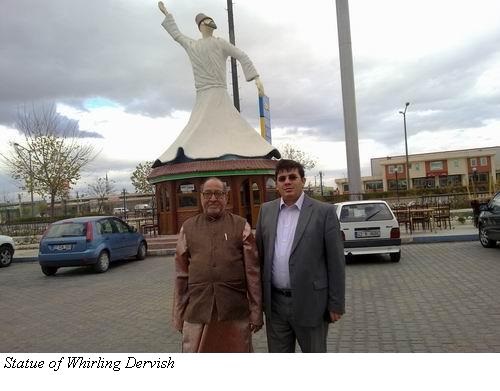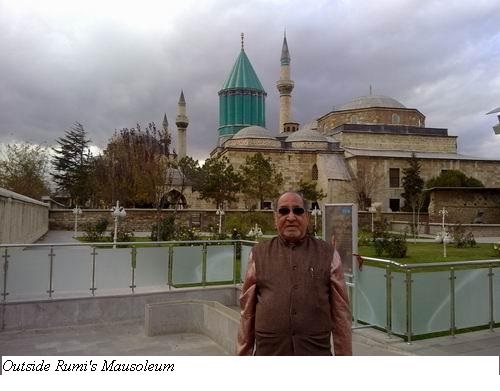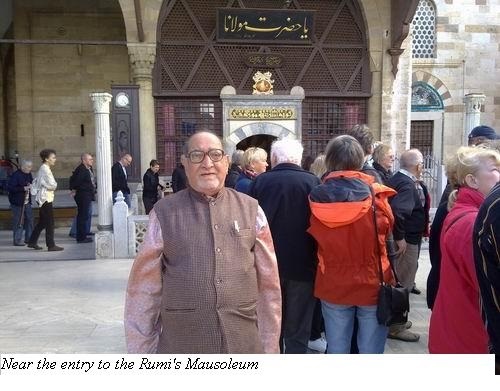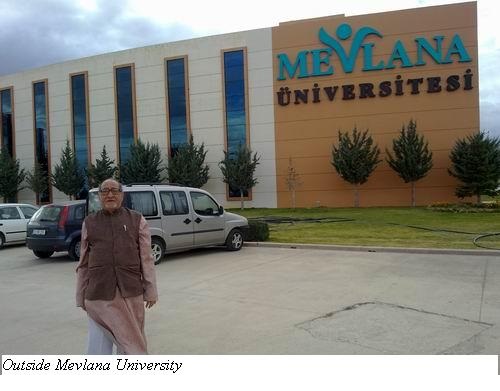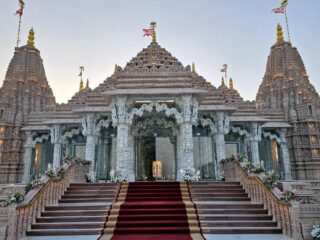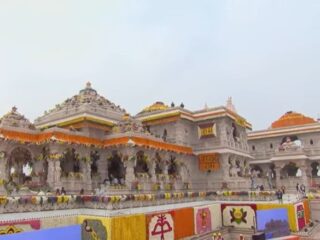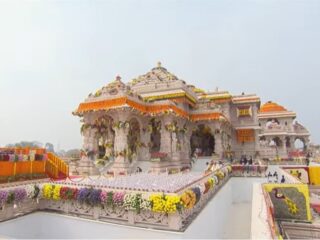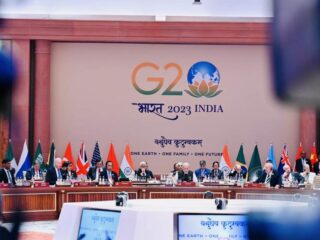Asghar Ali Engineer
(Secular Perspective, December 1-15, 2010)
I had visited Turkey twice before and was again invited for a conference on Family organized in Antalya by Writers’ and Journalists’ Foundation which took place from 26-27 November 2010. This conference was attended by delegates besides Turkey from 50 countries of the world and there were in all 600 delegates. It was an impressive performance. More about it later.
Earlier I had visited Istanbul and could not go outside that city for lack of time. The first time I visited Istanbul was in connection with the conference on Globalization ethics and Bediuzzaman Said Nursi’s Risale-i-Nur in September 2002 and second time I was invited by Heinrich Boll Foundation for a conference on “Islam and State” in which a large number of Turkish women had taken part. It was interesting to note that after my inaugural remarks the women began to speak mainly on hijab and overwhelming number of women were against hijab and only few women spoke for it. The situation has hardly changed.
It is also important to note that in cities like Istanbul, Antalya etc. one finds mainly women dressed in western dress but in smaller places and rural areas one finds more women in hijab but I did not find anyone in burqa i.e. covering themselves from head to toe including face. Another thing unlike in Arab countries and India too, women do not wear black coloured scarf or coat. The scarf and coat tends to be of different colours and designs. It makes women look more interesting.
The colour of skin of Turkish people is white and the country is also fast acquiring European standards of living and hence one feels on is in a European country. What is most impressive is cleanliness; it is indeed of European standard. I felt ashamed that our country, though much more economically and technologically advanced is so far behind Turkey in cleanliness standards. We see heaps of garbage everywhere even in cities like Mumbai. I did not see litter anywhere even in small towns like Konya or countryside of Anatolia.
Also one thing striking is that though Turkey is a hundred percent Muslim one hardly finds religious extremism there. Partly of course credit goes to Kemalism. But also there are more contemporary factors. One of the greatest modest Islamic movement is that of Fethullah Gulen who was voted in US survey as one of the top ten most famous persons in the world. He has been doing impressive work and has tried to convince people that Islam and modern science are not antagonistic to each other and that Muslims must acquire modern knowledge and should impress the world with achievements in modern sciences. He has inspired thousands of people to start modern universities.
Later in Antalya I met Prof. Anwar Jamal of West Asian Studies, Jamia Millia Islamia, Delhi who is in Turkey these days working for Fethullah Gulen movement and he told me that nothing like this exist in India. He also told me that the standard of social sciences in Turkey is quite high. They do not use English but only Turkish language and so we do not know much about their writings.
Prof. Anwar also told me that religion is coming back in Turkey but so far it has not acquired extremist form. It is not surprising because nothing fails like suppression of ideas and movements. No doubt Mustafa Kemal Pasha’s movement was greatly admired in mid-twenties when he introduced modernism in the country. But it was done forcibly and people were even forced to wear European dress and religious orthodoxy was punished in various ways and Government acquired total control of religion. Modernism and secularism has acquired roots in Turkey but religious orthodoxy could not be obliterated. The two co-exist with some tension though tension does not explode.
When Europe and America with much stronger roots in secular philosophy are witnessing revival of religion how can we expect Turkey to get rid of orthodoxy. In Turkey orthodoxy was suppressed rather than weakened through modernism as happened in Europe. From this perspective it is remarkable achievement that religious revivalism is much more controlled.
II
When I received invitation for the conference on “Family” I had requested Mr. Bilal of Indialog, a Turkish organization in India which runs schools in several Indian cities and promotes inter-religious dialogue, to arrange my trip to Qonia where Maulana Rumi lies buried and it has been my keen desire, as great admirer of Jalaluddin Rumi to visit his mausoleum. They were good enough to arrange my trip to Konya. Not only that Indialog provided me with the company of Mr. Yasar Susacan who accompanied me right from Mumbai to Istanbul to Konya to Antalya and back to Mumbai. Mr.Yasar’s company was highly useful in number of ways. Since he is Turkish I had no language problems and also my visit became much more useful as he had number of contacts.
Konya is a small but beautiful city. It is as clean as other parts of Turkey. It is developing fast as huge number of modern buildings and institutions are coming up. One sees of course more women in hijab here than say in Istanbul or Antalya. I must observe that people in Turkey are very hospitable like people of India. In this respect they have not been, Europeanized’. We took flight from Istanbul to Konya and were met at the airport by Yasar’s colleague Ozer Ozcelik. He took us for delicious Turkish dinner and next day took us around Konya along with the mausoleum of Mewlana (Maulana Jalaluddin Rumi).
It was my dream comes true. I read Mewlana’s Mathnawi (an epic poem in Persian in several volumes) when I was in matric in mid-fifties. This Mathnawi is rated so high that it called Qur’an in Persian. It is part of world classics today. Mewlana had very universal outlook and loved entire humanity without any distinction of religion. On the door of his mausoleum it is written “Ka’batul Ushshaq’ (i.e. Ka’ba of lovers). Love is at the very centre of his philosophy. If I could summarize it in one line it is ‘what is human heart without love but a fistful of clay.’
Visit to Mewlana’s mausoleum had great effect on me. I stood deeply reflecting for few minutes on his philosophy of love and recalling contents of his mathnavi. The dignity of the place is overwhelming and the way this dignity is maintained by visitors is indeed something to remember. What impressed me most was total absence of khuddam (servants) and nazar (offerings). There are no cash boxes even pleading visitors to donate money. Visitors come pray by themselves and depart the building’s interior is an architectural delight. It is so beautiful that one does not like to move out. The mausoleum also displays various musical instruments used in mehfil-e-sama’ (i.e. musical sessions) including flute. Malualan’s mathnavi begins with sad notes of flute. Also exhibited are his dresses and other things.
While observing the dignity of the place I was comparing it with Sufi mausoleums in India. Hundreds of khuddam run after you and want you to offer nazars which are pocketed by them. In many cases they chase you right from railway station or bus station. It reflects nothing but greed. Mewlana’s Urs is celebrated in December every year but no tradition of offering chadors. I was told that it is once in two or three years that chador is changed when old chador becomes dirty. No body is allowed to touch or kiss the grave. Even flowers are not offered. I wish such dignity is maintained in Sufi mausoleums in India also.
III
Now a few words about the conference on Family in Antalya. It was held in a beautiful hotel on seaside. Though there were 600 delegates from 50 countries conference was conducted in a very orderly manner. The theme ‘family’ was chosen as structure of family is being weakened throughout the world including Turkey. I was invited to chair one of the panels where I was also keynote speakers. I spoke on Qur’an, Islam and Women. I analyzed the causes of weakening of institutions of family and said real culprits are patriarchal values and if they are continue to be imposed on women the institution of family will not be stabilized.
Today women are highly educated and aware of their rights and hence must be treated with respect and dignity failing which they will not submit to the authority of men. The Qur’an understood this well and not only gave equal rights to women but also exhorted men again and again that consult your wives in any decision in which she has to play a role. Even today with all our democracy our family continues to be an authoritarian structure in which husband takes all decisions and she is not equal partner in any major decision. In Qur’an entire discourse pertaining to women is right-oriented whereas in Shari’ah law entire discourse pertaining to her has become duty-oriented. This contrast between Qur’an and Shari’ah should be eliminated.
Today women also earn and contribute to the family income then why should she submit to husband’s authority? Both should respect each other’s role in family matters. The Prophet (PBUH) exhorted men to be an ideal husband and warned them against holding threat of divorce against their wives. Qur’an instituted reconciliation through hakamain (arbitrators) before any divorce. And man is considered ABSOLUTE AUTHORITY in matters of divorce which is quite un-Qur’anic. A modern woman with all her awareness and contribution to family wealth cannot accept such absolutism.
All the papers presented have been published before the conference and are available in a book form entitled Family. It has more than 400 pages. The papers are by academics from various disciplines, media persons, theologians of various religions and activists. The conference had presenters and participants of all the major faiths like Judaism, Christianity and Islam. By all means it was an interesting event and only criticism I have is that more time was spent on presentation and there was not much time left for discussion.
——————————————————
Centre for Study of Society and Secularism
Mumbai: – 400 055.

